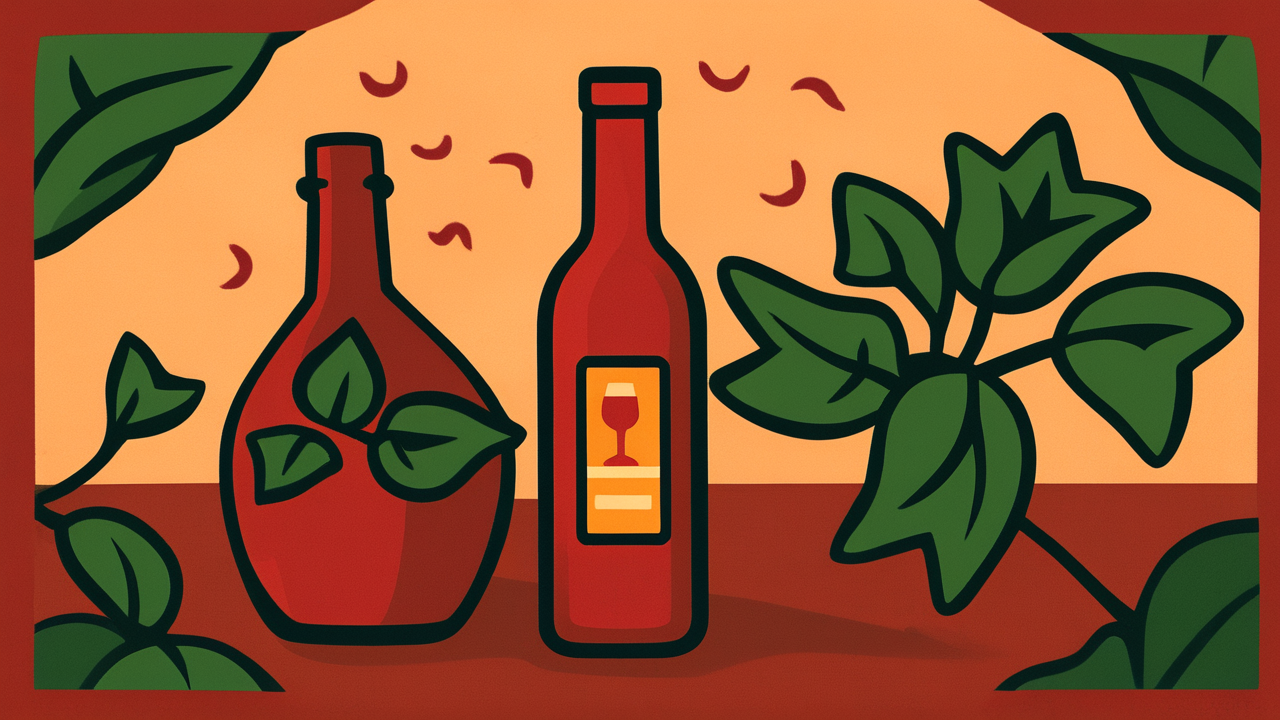How to Read “良いワインに蔦はいらない”
Yoi wain ni tsuta wa iranai
Meaning of “良いワインに蔦はいらない”
This proverb means “truly excellent things will naturally be recognized for their value by people, even without special advertising or embellishment.”
Quality wine can be immediately appreciated for its excellence when actually tasted, even without flashy advertising copy, beautiful labels, or luxurious packaging. Similarly, it expresses that truly valuable things and excellent people will naturally be evaluated based on their actual ability and quality, without needing to loudly promote themselves or embellish their appearance.
This proverb is used when expressing feelings of humility or when emphasizing meritocracy. It is also used when conveying the importance of discerning essence without being misled by excessive advertising or superficial glamour. In modern times, it is often used in contexts that emphasize the importance of having the eye to discern true value amid the overflow of advertisements and promotions.
Origin and Etymology
Regarding the origin of this proverb, there is currently no clear established theory. It is generally believed to have entered Japan as a translation of the Western proverb “Good wine needs no bush,” but there are various theories about the circumstances and timing of this.
In the West, there was an ancient custom of taverns and bars hanging ivy branches at their storefronts to indicate they sold alcohol. This was a tradition dating back to ancient Roman times, where ivy, a plant dedicated to Bacchus, the god of wine, was used as a sign for establishments dealing in alcohol. However, this expression is thought to have originated from the idea that truly quality wine would not need such signs or advertising.
The period of introduction to Japan is not certain, but it is believed likely to have been introduced along with the influx of Western culture from the Meiji period onward. However, since Japan did not actually have the custom of using ivy as tavern signs, this proverb was accepted purely in a metaphorical sense. Therefore, for Japanese people, it came to be understood more as an abstract lesson that “good things need no advertising.”
Usage Examples
- That craftsman has a good reputation even without advertising – it’s a case of “Good wine to ivy does not need”
- With her ability, “Good wine to ivy does not need,” so she’ll surely be recognized naturally
Modern Interpretation
In modern society, the meaning of this proverb has become more complex. With the spread of social media and the internet, an increasing number of people question the idea that “good things naturally spread.”
In an age of information overload, even the most excellent products and services face a high risk of being buried without appropriate marketing. Particularly for startup companies and individual creators, the choice to “not advertise” can directly lead to business failure. Therefore, in modern times, the opposite way of thinking has emerged: “even good wine needs ivy.”
On the other hand, it could be said that the original meaning has become more important in modern times, with the increased influence of word-of-mouth and review sites. There is a tendency to value actual user evaluations over superficial advertising, and as a result, systems are being established where truly good things are evaluated.
Moreover, with influencer marketing becoming mainstream, the boundary between “natural advertising” and “manufactured advertising” has become ambiguous. Consumers also need a more discerning eye to distinguish genuine value, and the lesson of “seeing through to the essence” that this proverb contains may be wisdom that should be applied even more in modern times.
When AI Hears This
In the world of social media marketing, follower counts and likes are treated as indicators that determine a product’s value. However, interestingly, a phenomenon is occurring where truly superior products need less flashy promotion.
For example, many of the world’s finest wineries fall far behind emerging brands in Instagram follower counts. Yet they maintain an overwhelming advantage in sales and customer satisfaction. This phenomenon can be seen as a modern version of “good wine needs no bush.”
Even more surprising is the change in consumer behavior. According to marketing research, about 40% of people in their twenties responded that they “have regretted buying products that were trending on social media.” In other words, there’s a growing reflection on being swayed by flashy advertising.
This paradoxical relationship also highlights the limitations of influencer marketing. Products that attract attention through superficial “visual appeal” may sell temporarily, but they tend to have low repeat purchase rates. Meanwhile, products that may seem plain but possess intrinsic value spread quietly through word-of-mouth and achieve long-term success.
In today’s social media society, this proverb teaches us anew the importance of having “an eye for authenticity.” The ability to discern true value behind flashy advertising is the hallmark of a smart consumer.
Lessons for Today
What this proverb teaches modern people is “the importance of having the eye to discern genuine value” and “the importance of polishing one’s own essence.”
Precisely because we live in an age overflowing with information, it becomes important to have the power to see through to the essence of things without being misled by superficial advertising or glamorous appearances. Whether choosing products or evaluating people, we want to develop the habit of first considering “what is the substance?”
At the same time, this proverb serves as a warning to ourselves. While we tend to become obsessed with collecting “likes” on social media and showing off in modern times, what is truly important is polishing our own abilities and character. How about directing the energy we spend on embellishing our appearance toward enriching our inner selves?
Also, when we encounter excellent people or things, we want to have the mental capacity to honestly acknowledge them. We want to be people who can notice genuine value that shines quietly, even without flashy advertising. By having such perspective, life should become richer and more meaningful.



Comments